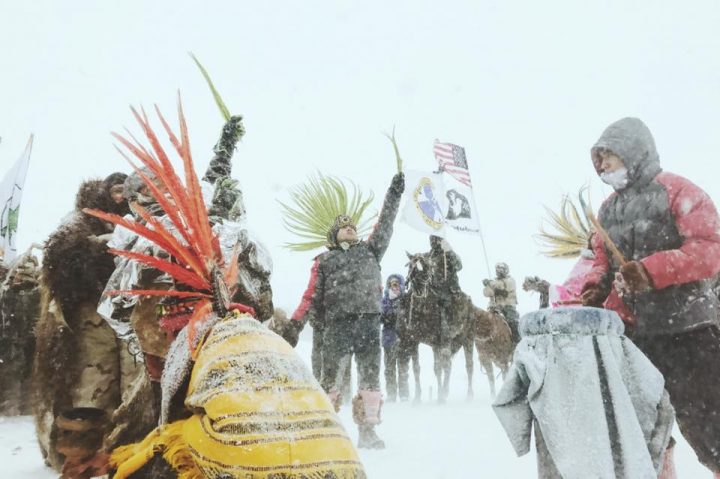Veterans For Peace is a global organization of Military Veterans and allies who aim to build a culture of peace by using their experiences, informing the public of the true causes and the enormous costs of wars and employing nonviolent means. We have interviewed Tarak Kauff, national board member of VFP, about his experience supporting the resistance against the Dakota Access pipeline at Standing Rock.
Why did you decide to join the fight of the Natives at Standing Rock?
There are a few major reasons I decided to go to Standing Rock and join the struggle. Like many of us, I care deeply about the environmental degradation of the earth. The corporate fossil fuel industry’s and capitalism’s attitude and practice of seeing the living planet as only a resource to be exploited – is, considering all the science on climate change and the advantage of using renewable energy sources – an insane addiction to profit and power over people and the planet. The Water Protectors courageous resistance at Standing Rock to this addiction that is destroying the planet was something I felt I (and Veterans For Peace) had to support and join.
As a national board member of Veterans For Peace (VFP), I saw that the DAPL pipeline, besides being an affront to the planet, was yet another episode in the 500-year long, ongoing genocidal war on First Nation people. VFP has a commitment to end war as an instrument of national policy. That means to end war in all its horrific and destructive aspects.
This includes the fossil fuel industry’s war on Mother Earth. It includes all forms of violent oppression of living beings. We see it all as war.
We also saw the resistance at Standing Rock as setting an example nationwide, and even worldwide, for powerful nonviolent, even prayerful resistance. We saw that resistance as having a chance of seeing people united, being victorious over the enormous combined power of corporate and governmental oppression.
This potential and very important people’s victory was something VFP had to join.
Where did you find the courage to resist violence and arrests?
Courage comes when one is convinced that you are doing something that is right, that you are united with others in a struggle, not only for the water, but for our very existence on this planet. We all have courage inside and when you love something, as the native people and many of us non-natives as well, love the living earth, you must protect it. Being brave has nothing to do with it. You are compelled, like a mother to protect her children, to protect that which you love. Courage comes from that love.
How did you experience the asking for forgiveness for the crimes committed by the U.S. army and the relation with the Natives?
This was perhaps the most powerful and emotionally moving aspect of my entire experience over three trips to Standing Rock. It was healing. The willingness to ask for forgiveness for all the past atrocities (and present) committed by the predominantly dominant white Eurocentric society, of which I am not only part of but in ways have benefitted from the oppression of others (white privilege) from the stolen land and resources was and is essential.
People like myself can say that we personally were not responsible for that, but we benefitted from it and so we are connected to it, and yes, as we, the veterans who were there, needed to experience this healing forgiveness from First Nation people. The tribal leaders emphasized that they would never forget, but that forgiveness was the way forward.
Can you tell us something about future actions of solidarity the Veterans for Peace are planning to support the resistance at Standing Rock?
Veterans For Peace will respond and follow the call and the direction of First Nation leadership. We will mobilize and are willing to go out to Standing Rock again as the native leadership feels is necessary. In the meantime, we will continue to cover, support and promote the native resistance in our quarterly newspaper, Peace in Our Times and online at our web site, www.veteransforpeace.org.






